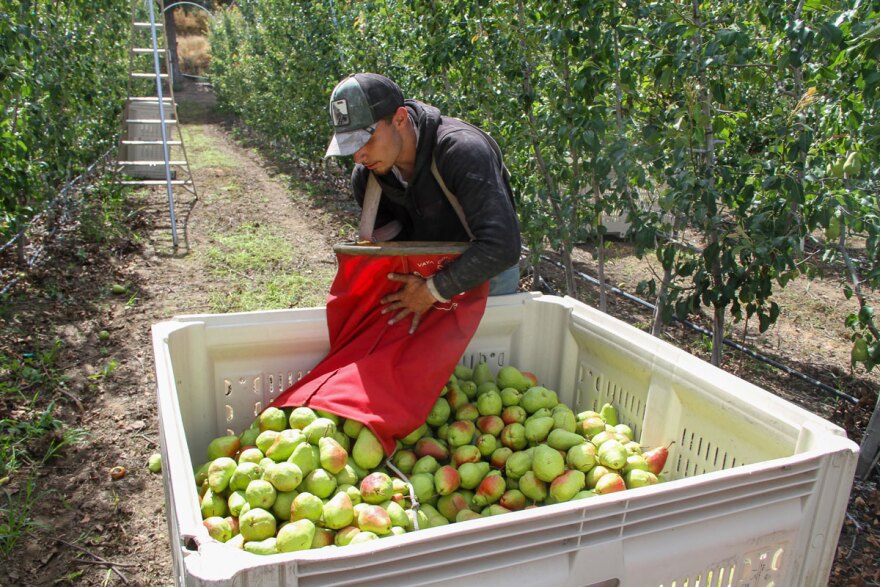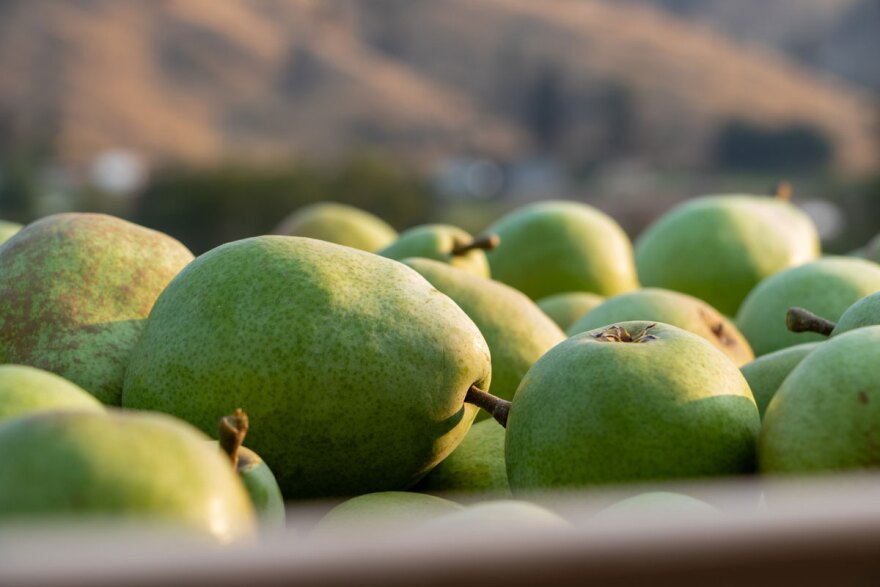The closure of Del Monte Foods’ pear cannery is rumbling through Washington’s tree fruit industry, leaving growers without contracts, fruit rotting in orchards and fresh markets oversupplied with pears never meant to end up there.
Edgar Hernandez, a farmer in Moxee, said he couldn’t send his pears anywhere because the cannery closed.
“It’s pretty much a hundred percent loss and that’s a big impact for us,” said Hernandez.
The Yakima facility, which shut down in early August, had long been a cornerstone of the Pacific Northwest’s pear industry. About a decade ago, Del Monte processed more than 50,000 tons of pears. According to a worker adjustment and retraining notification layoff and closure database, Del Monte Foods laid off 51 full-time workers in August after first notifying them in June. The company declared bankruptcy in July.
According to a report by the Yakima Herald-Republic, Del Monte Foods “needed to align the business with consumer demand,” said Carissa Sauer, the company's senior manager for corporate communications.
Jon DeVaney, president of the Washington State Tree Fruit Association, said many growers were blindsided by the move. The Del Monte Foods cannery exit leaves just one major cannery in Washington state: Northwest Packing Company, owned by Neil Jones Food Company.
“Growers had to then struggle to find alternate customers,” DeVaney said. “If you were a pear grower growing for the canning market, it created a lot of dislocation.”
According to DeVaney, contracts were canceled only weeks before harvest, leaving some growers without options. Unlike apples or cherries, pears intended for canning are grown and sized specifically for that use. Smaller fruit, which can be peeled and processed, often doesn’t meet consumer expectations for the fresh market.
“What is ideal sizing for going into a can is not necessarily the same as what is ideal sizing for fresh consumers,” DeVaney said. “So that has led to some increased supply in the market this year, and it was already a large crop.”

DeVaney said demand for pears decreased after the pandemic. For many growers, that meant seeing their crop become less valuable at a time when costs to produce and harvest remain high.
“It’s not easy to just flip a switch and say, 'Well, I’ll grow something else,'” DeVaney said. “Pear trees are long-lived and slow to get to full maturity, so the dislocation the industry is feeling right now is particularly harsh.”
Hernandez, the farmer in Moxee, has grown pears for the cannery for years and just completed a three-year contract with Del Monte. He said one year, a hailstorm damaged most of his crop, and the pears weren’t large enough for packing quality. The cannery accepted smaller fruit, so the farm continued growing pears, sending its entire crop of about 500 bins per year.
“Right now, agriculture is going through a crisis. We’d like there to be more exports and more free trade so we could export our fruit to other countries. I’d like to see more variety and more options for how to sell the fruit,” Hernandez said in Spanish.
Industry leaders sought help from the federal government, urging the U.S. Department of Agriculture to make emergency purchases of fresh and canned pears. The USDA responded quickly, DeVaney said, absorbing some of the excess supply and offering temporary relief.
Andrew Sundquist, president of Sundquist Fruit & Cold Storage in Yakima, said the closure hit at the worst possible time.
“There’s a lot of orchards, if you drive around the Yakima Valley, where the fruit is on the ground because it just didn’t get harvested,” Sundquist said.
The timing was especially punishing. According to Sundquist, after one of the smallest crops in decades in 2023, Washington growers saw a rebound this year with a harvest nearly 60% larger than last year. That bumper crop, paired with the sudden loss of Del Monte, swelled supply far beyond demand.
“It’s supply and demand,” Sundquist said. “Having too big of a crop is a bad thing because it costs you more to harvest it, and you get less per unit back.”

For now, growers face difficult decisions. Some may retool their practices to produce larger fruit for the fresh market. Others may reconsider whether to grow pears for processors at all.
For Alez Lanuza, a grower in Cashmere, the shift is personal. He worries about wasted food and the future of small growers like himself.
“It’s good fruit, it’s just small fruit,” said Lanuza. “But now it’s just going to waste.”


